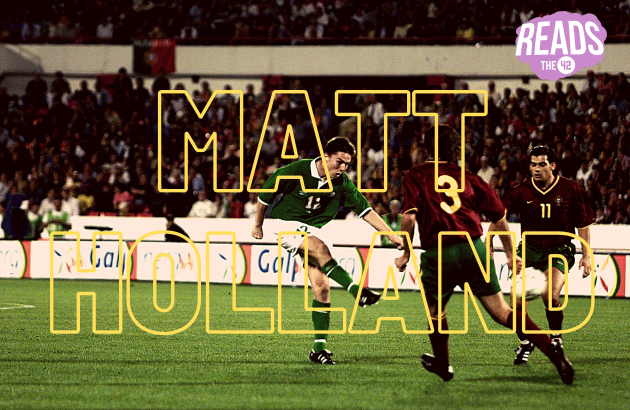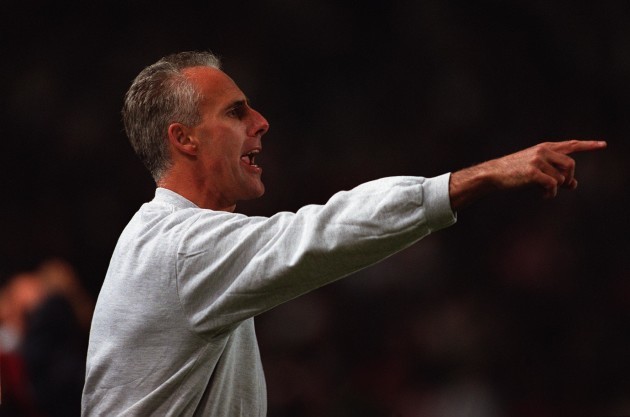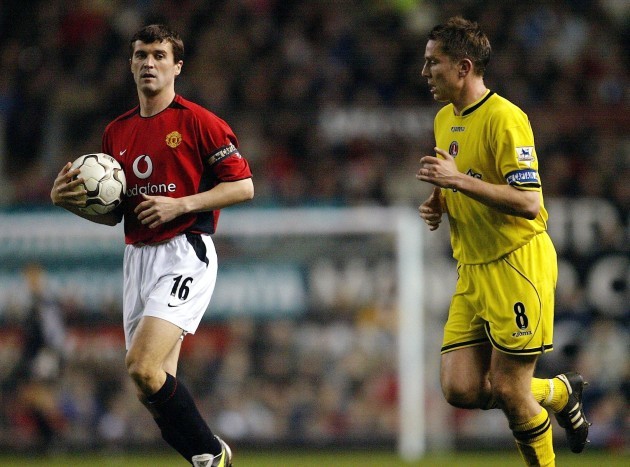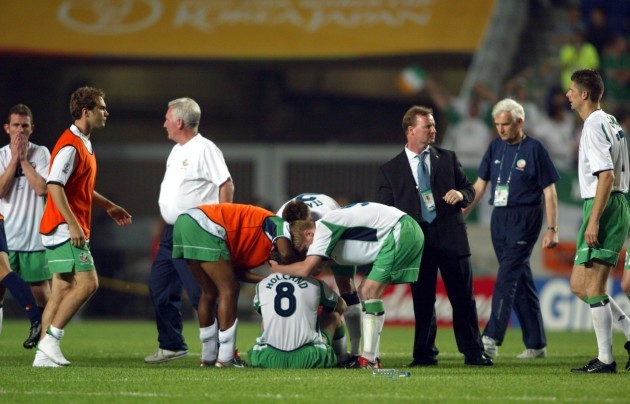IN SOME RESPECTS, not much has changed in 21 years.
Back around the turn of the millennium, Ireland were drawn in a World Cup qualifying group with Portugal and not many people were tipping them to qualify.
The Portuguese were formidable opponents then, as were the other side most critics expected to contend for top spot in the group — the Dutch.
They were two of the best international teams in the world at the time, as illustrated by the fact that only a few months before their opening respective home qualifiers against Ireland, they each reached the semi-finals of Euro 2000.
Ireland will feel they should have been at the tournament too and would have qualified had it not been for the cruel concession of a last-gasp equaliser in their final group game against Macedonia.
- For more great storytelling and analysis from our award-winning journalists, join the club at The42 Membership today. Click here to find out more >
Though overshadowed by the heartbreak of the result, that fixture was also notable for being Matt Holland’s international debut, as he replaced Mark Kennedy with five minutes remaining in an attempt to shore up the midfield.
“I was looking around the dressing room after thinking: ‘Blimey, what’s just happened?’” he recalls.
“We were a bit shellshocked, a bit angry, there were all sorts of emotions going on. So it wasn’t the best game to make your debut. You look back with disappointment and hurt with that sort of setback, but it spurs you on to do better next time.”
Indeed, when the 2002 World Cup qualifiers came around, the Irish team appeared more determined than ever not to let the opportunity slip through their grasp and Holland was similarly ready to step up to the next level.
After a creditable 2-2 draw away to the Netherlands in their opening qualifier in September 2000, it was scoreless at half-time in Portugal the following month when Holland replaced the injured Niall Quinn and Ireland went to a five-man midfield.
Holland was old enough by footballing standards as he was making his international breakthrough, having turned 26 the previous April.
Yet the midfielder was used to doing it the hard way. Born in Bury and qualifying for Ireland through a Monaghan-born grandmother, he was rejected by Arsenal as a youngster for being ‘too small’. He then spent a couple of years at West Ham, but failed to make the first-team breakthrough there, subsequently dropping from the Premier League to the third tier of English football with Bournemouth. He gradually made his way back up to the top flight and by the time of the Portugal game, Holland was two months into his debut Premier League campaign, captaining a newly promoted Ipswich side who would go on to finish fifth, only missing out on Champions League football on the final day of that season.
In the previous campaign, he had been integral to their successful promotion bid, scoring 10 goals in 46 appearances.
Remarkably, in his six years at Ipswich, Holland missed only one league game, and that was because of international duty.
This reputation for reliability was no doubt a factor in Mick McCarthy’s decision to call him up in the first place, having consulted with the Tractor Boys’ manager George Burley initially.
Roy Keane notably appeared to question Holland’s Irishness in his autobiography ‘The Second Half,’ a criticism he naturally rejects and the performances he produced on the pitch suggested he was never anything but committed to the Irish cause.
“I thought someone was putting on an accent and pretending to be Mick,” Holland says of his first conversation with the then-Ireland manager. “But he just asked: ‘Would you be interested?’ I had no hesitation and said ‘yes.’”
And it was on his fifth cap, in the Estádio da Luz, Lisbon, that Holland truly announced himself on the international stage against a side that boasted several world-class operators in their team.
“Rui Costa was an unbelievable player and obviously Luis Figo drifting in,” he remembers. “Joao Pinto as well, there was real quality in that Portuguese side.”
A central midfield of Holland, Roy Keane and Mark Kinsella were initially tasked with containing the opposition’s abundance of world-class players.
That plan changed, however, when Sergio Conceicao put the hosts ahead in the 57th minute.
“They had a lot of the ball, quite a few chances,” Holland recalls. “The instruction was to just sit in front of the back four and try to protect, let Roy and Kins get tight to people in midfield. That was the initial plan really, and then they took the lead. It changes things. You have to adapt your game. We started to push farther forward.”
With 18 minutes remaining, Holland received the ball from Keane. He powered purposefully forward through the space that opened up, taking three touches before producing a stunning arrow-like effort from 25 yards out that eluded Joaquim ‘Quim’ Silva’s grasp and found the corner of the net.
“To get your first goal [for Ireland] and do it in such an important game was pretty special,” he says.
“That, on a personal level, was the biggest moment [in my career at the time], to score a goal in a World Cup qualifier against a European powerhouse away from home, big crowd, great atmosphere. We were under pressure for a lot of that game and then to come up with a goal, that meant so much to everyone.
“And the group of players were absolutely special. It’s a dream come true to represent Ireland and to play an important part in that qualifying campaign was extra special. The messages and everything that came with it afterwards, it really was a rollercoaster few days.
“Then the next game was Estonia at home and I’m back on the bench. You think you’re maybe going to get the nod and get into the team, but you’re quickly brought back down to earth. You know what Mick’s like.”
Increasingly though, Holland was beginning to earn the manager’s trust, featuring in 10 of the 12 qualifiers overall during that campaign.
It remained tight between himself and Mark Kinsella for the second midfield spot alongside Roy Keane. But with the Charlton man injured, Holland got the nod for the famous 1-0 win over the Netherlands and then, he was preferred to the Dubliner in the starting XI for the home play-off against Iran.
Before the 2002 World Cup, it was far from clear cut, but Holland felt he would edge Kinsella for a starting spot. But while rivals for a place in the team, they were friendly off the pitch.
“We’d come up against each other quite a few times. Ipswich and Charlton had a few running battles. I started talking to him about Ireland after the games and stuff. So we had some good battles with each other on the pitch. I’ve lived in Colchester as well. His father-in-law was involved in Colchester United, so I knew Kins quite well.
“Roy was the automatic choice, of course, a world-class player. And then you’re fighting to get into the team and it’s an ongoing battle, isn’t it? You support the 11 that are picked if you’re not involved and if you are involved, you hope you give the same passion back and we always did. There’s competition, and I think that spurs you on to better performances when you know someone is breathing down your neck.
“If you’re speculating and looking at the squad numbers [for the World Cup], I got number 8 and Kins was 12. So you look at it and think maybe I’ve got the nod here.”
Of course, with Keane unavailable after the Saipan debacle, both players ended up starting all four of Ireland’s matches in Korea and Japan.
With the Man United star absent in such controversial circumstances, there was inevitably an increased level of scrutiny on the central midfielders.
“You feel pressure anyway when you’re going to a World Cup tournament. It adds pressure when you lose someone of Roy’s quality.
“Are we going to be able to cope without Roy? Are we going to be able to deal without our big presence, our captain? So I suppose you feel that extra bit of responsibility. Kins and I always had a good relationship. It wasn’t a problem. We’d played without Roy previously in games where he’d been suspended and missed matches. It was one of those things, unfortunately. It could have been an injury that robbed us of Roy throughout that tournament.
“But we had coped without him in the past, so I think we felt we could deal with it.”
It was still a surreal situation for Holland. He had grown up idolising Keane. In their early days together in the Ireland set-up, he would try to get as much information from the Corkman as possible about the Man United set-up, while closely watching him in training and trying to pick up some of the star’s good habits. Now, all of a sudden, he was expected to replace him at a World Cup.
“Growing up, I was a big Man United fan and Roy was one of the ones I looked up to. He was someone you wanted to try to emulate your game on as well, he was such a good player. As an individual, you’re always looking to improve and get better. And to do that, you have to look at the best players, come up against the best players, test yourself and learn from them. Watching Roy, the way he did things, you obviously try to learn as best you can.”
Even as a Premier League player approaching the peak of his career, Holland was still learning from Keane.
In the early stages of that famous victory over the Netherlands, Holland noted how Keane put in a crunching challenge on Marc Overmars, one of the opposition’s best players. Not only did the tackle let the ex-Arsenal and Barcelona star know he was there, but it also intensified an already boisterous Lansdowne Road atmosphere.
Without Keane, in their opening World Cup group game, Holland put in a similarly strong challenge on Marc Vivien Foe, in the process sending out a message to the opposition that they were in a game. It also had the effect of emphasising that the Irish midfield would not be lacking any of its usual bite despite the absence of its most famous name.
“That was a big moment for me, that tackle. Sometimes it might be a goal, sometimes it might be an effort on goal from a distance to get a reaction from the crowd, this time it was a big tackle that got the crowd right up for it, not that they needed much help because the atmosphere was unbelievable anyway, but that makes a big difference sometimes.
“It can send a little message out to the opposition and send a message to your own fans. I guess if the ball is there to be won and you can make a statement challenge, then why not?
“I’ve actually got that picture up on the wall, the tackle on Foe. It’s obviously very sad what happened to him (Foe died tragically just a year later after collapsing on the pitch). But that tackle was a good moment for me personally.”
Holland would go on to deliver an inspirational Keane-esque performance, hitting a wonderful bullet of a strike to earn Ireland what proved to be a crucial 1-1 draw with Cameroon.
He had not only justified his selection but briefly made everyone forget about Keane, who was well on his way to becoming a national obsession at that point.
Afterwards, McCarthy said he was coming out of “the hardest week possible but coming into the game today was a blessed relief”.
He described Holland as the man of the match, while also hailing Kinsella.
“Together they were superb,” he told reporters. “I bear no malice [to Keane] in that comment, but the pair were under a lot of pressure to perform and I thought they were magnificent.”
Before the game, McCarthy put a sign up in the dressing room with the phrase ‘no regrets’ and Holland certainly didn’t have any after his performance that day.
“We hadn’t played particularly well in the first half, but we responded well in the second, so it was a much-needed goal and much-needed result for us as a group,” he says. “Without Roy as well, to go on and get that point, that was important just to keep us in a position where we felt we could go on and qualify.”
Robbie Keane’s last-gasp equaliser in the next game against Germany was similarly pivotal before a convincing 3-0 win over Saudi Arabia ensured they progressed from the group stages.
It would end in heartbreak though for Ireland and Holland in particular. In the last-16 encounter with Spain, many felt McCarthy’s side deserved to progress. They enjoyed 55% possession and were left to rue an Ian Harte penalty miss in normal time as it finished 1-1. The clash ultimately went to a shootout, with the Spaniards triumphing 3-2 after Holland, David Connolly and Kevin Kilbane had all missed their spot-kicks.
“From an individual point of view, you go from one of the highest moments of your career, scoring against Cameroon, to the lowest, missing the penalty. It was as flat and low as I’ve ever felt after a football match. I cried very few times in my career, but that was a real tearjerker, it was devastation really. I look back on that and we had more of the ball and more shots. Not many teams can say they had more of the ball than Spain. And we did. We played well and I think, over the course of the 120 minutes, we deserved to go through.”
Of the penalty miss, Holland adds: “I was probably fortunate that social media wasn’t a big thing then. You rely on the support of those around you, those closest to you, your teammates, family, friends to try to pick yourself back up again. That moment will always be there, it’s always in the back of your mind. But when you get across the white line into the next game, you put it to the back of your mind, but you need good people around you. You’ve got to try to do your best to switch off at times. It’s not easy.”
For the most part, though, he reflects fondly on that incredible summer.
“The fact that my dad was able to come to the first couple of games, my wife and boys were there as well, that was huge.
“I’m looking at the ball in front of me [as I speak to you]. Mick Byrne managed to get the match ball after that Cameroon game, so I’ve still got that in the office right now with my caps.
“There are some amazing memories. It was a great experience. One I look back on and think ‘what if’ sometimes — how we went out and everything. But to be able to share it with so many class people, that will never, ever be forgotten.”
The aftermath, both for Holland and Ireland, was slightly anti-climactic. Having felt the team would kick on, the opposite essentially occurred. A poor start to the subsequent qualifying campaign cost McCarthy his job. Brian Kerr took over but the side failed to qualify for successive tournaments. Holland gradually found himself slipping down the midfield pecking order. Injuries were also starting to take their toll and in 2006, despite Steve Staunton trying to dissuade him from doing so, he retired from international duty at the age of 31.
“In hindsight, I probably made the wrong decision. It was tough. I’d gone through a spell where I was featuring less and less. I was travelling and not being involved as much as I’d liked to have been. Throughout my career, I was used to being a regular.
“A group of players who don’t go away on international duty, they have 4-5 days off and time to recuperate. Straight away after a match, you’re trying to recover, but the older you get, the harder it is to recover from little knocks and bruises, which makes it more difficult. When you don’t travel, you do get extra time to get yourself fully fit again. So that sort of played on my mind a little bit as well.”
He carried on playing at club level for another three years and “really struggled” for a year after he hung up his boots for good as he tried “to fill a really big gap in my life”.
Having considered coaching, Holland found more opportunities in media work and these days has forged a successful career as a pundit with several different outlets.
“Don’t get hurt by setbacks and rejection because everyone is going to get them,” he adds. “Someone is going to tell you you’re not good enough or not quite up to it — you’re always going to be told that. But have the self-belief to say that you can reach the top. You might have to take a step back to come back again, you might have to move teams because a different manager thinks you’re right for him. But at the end of the day, it’s only one person’s opinion. Too many people get told that and then don’t ever recover from it.
“Harry Kane went on loan to Leyton Orient and they didn’t really think he was all that, didn’t think he’d have much of a career. And he’s not done too badly, has he?”
And finally, does Holland have any advice for Ireland’s footballers as they prepare to face Portugal away on Wednesday?
“If it opens up and you’ve got a chance to have a shot, take that opportunity, because you never know what might happen.”
Matt Holland is a patron of Inspire Suffolk charity. More info here.
- For more great storytelling and analysis from our award-winning journalists, join the club at The42 Membership today. Click here to find out more >




